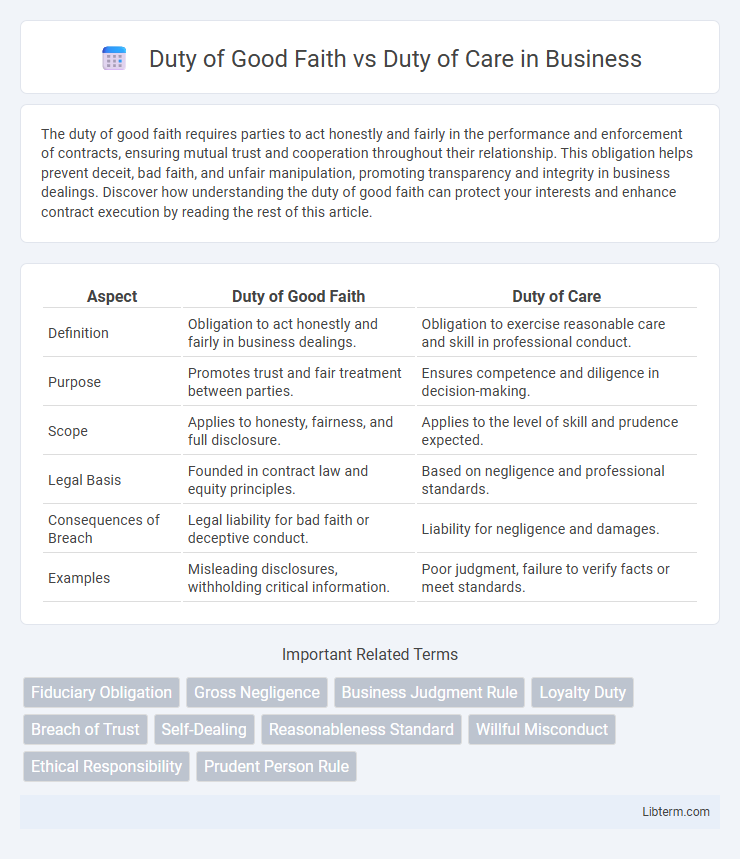The duty of good faith requires parties to act honestly and fairly in the performance and enforcement of contracts, ensuring mutual trust and cooperation throughout their relationship. This obligation helps prevent deceit, bad faith, and unfair manipulation, promoting transparency and integrity in business dealings. Discover how understanding the duty of good faith can protect your interests and enhance contract execution by reading the rest of this article.
Table of Comparison
| Aspect | Duty of Good Faith | Duty of Care |
|---|---|---|
| Definition | Obligation to act honestly and fairly in business dealings. | Obligation to exercise reasonable care and skill in professional conduct. |
| Purpose | Promotes trust and fair treatment between parties. | Ensures competence and diligence in decision-making. |
| Scope | Applies to honesty, fairness, and full disclosure. | Applies to the level of skill and prudence expected. |
| Legal Basis | Founded in contract law and equity principles. | Based on negligence and professional standards. |
| Consequences of Breach | Legal liability for bad faith or deceptive conduct. | Liability for negligence and damages. |
| Examples | Misleading disclosures, withholding critical information. | Poor judgment, failure to verify facts or meet standards. |
Introduction to Fiduciary Duties
The duty of good faith requires fiduciaries to act with honesty and loyalty, prioritizing the interests of beneficiaries above their own. The duty of care mandates fiduciaries to perform their responsibilities with competence, diligence, and prudence in managing assets or affairs. Both duties form the cornerstone of fiduciary responsibilities, ensuring ethical conduct and protection of stakeholder interests in trusts, corporations, and other fiduciary relationships.
Defining the Duty of Good Faith
The Duty of Good Faith requires parties to act honestly, fairly, and sincerely in contractual and fiduciary relationships, ensuring that no party undermines the agreed-upon purpose or exploits the other. This duty is distinct from the Duty of Care, which mandates reasonable prudence and competence in performing obligations or services. Good Faith emphasizes ethical conduct and trustworthiness, serving as a foundational principle in contract law and corporate governance.
Understanding the Duty of Care
The duty of care requires individuals to act with the level of caution that a reasonable person would exercise in similar circumstances to prevent harm to others. It is a fundamental principle in tort law aimed at minimizing risks and ensuring safety in various contexts, such as professional services and everyday activities. Understanding the duty of care involves recognizing the foreseeability of harm and the standard of behavior expected to avoid negligent acts or omissions.
Key Differences Between Good Faith and Care
The duty of good faith requires parties to act honestly and fairly without intent to deceive or defraud, emphasizing ethical conduct in transactions. In contrast, the duty of care mandates individuals to exercise a reasonable standard of care and diligence to avoid causing harm or loss to others. Good faith centers on honesty and fairness in relationships, whereas care focuses on prudence and caution in actions.
Legal Foundations of Each Duty
The Duty of Good Faith is rooted in contract law and equity, requiring parties to act honestly and fairly to uphold mutual trust and cooperation during contractual performance. The Duty of Care stems from tort law principles, obligating individuals or entities to exercise reasonable care to avoid foreseeable harm to others. Both duties are foundational in legal systems but serve distinct purposes: good faith ensures ethical dealings between parties, while care addresses prevention of negligence and harm.
Common Breaches and Consequences
Common breaches of the duty of good faith include acts of dishonesty, withholding critical information, and failure to act in the best interest of the other party, often resulting in contract termination or damages claims. Breaches of the duty of care typically involve negligence, such as inadequate supervision or failure to meet professional standards, leading to compensation for losses or professional disciplinary actions. Courts impose significant legal consequences for violating these duties, emphasizing the importance of trust and diligence in commercial and fiduciary relationships.
Real-World Case Studies
In real-world case studies, the Duty of Good Faith requires parties to act honestly and fairly, preventing deceitful practices in contractual relationships, as seen in *Yam Seng Pte Ltd v International Trade Corporation Ltd* where the court emphasized honest conduct. The Duty of Care, highlighted in negligence claims such as *Donoghue v Stevenson*, mandates that individuals take reasonable care to avoid causing foreseeable harm to others. Courts often distinguish these duties by focusing on the relational context: good faith applies primarily in contractual performance, while care relates to preventing physical or economic injury.
Impact on Corporate Governance
The Duty of Good Faith mandates directors to act honestly and in the best interest of the corporation, ensuring decisions align with the company's purpose and stakeholder welfare. The Duty of Care requires directors to make informed and prudent decisions by exercising reasonable diligence, competence, and attention to corporate matters. Together, these duties foster transparent governance, enhance accountability, and mitigate risks of mismanagement, thereby strengthening corporate integrity and shareholder confidence.
Best Practices for Compliance
Duty of Good Faith requires parties to act honestly and fairly, avoiding deceit or subordination of others' rights, which ensures trust and integrity in contractual relationships. Duty of Care emphasizes taking reasonable steps to prevent harm and protect stakeholders, promoting vigilance and prudence in business operations. Best practices for compliance include regular training on ethical standards, implementing clear policies to identify and manage conflicts of interest, and conducting thorough risk assessments to uphold both duties effectively.
Conclusion: Balancing Both Duties
Balancing the Duty of Good Faith and the Duty of Care requires integrating honesty and fair dealing with meticulous attention to detail and prudence. Corporations and fiduciaries must ensure transparency while exercising reasonable judgment to protect stakeholders' interests effectively. Achieving equilibrium between these duties promotes trust and minimizes legal risks in contractual and professional relationships.
Duty of Good Faith Infographic

 libterm.com
libterm.com